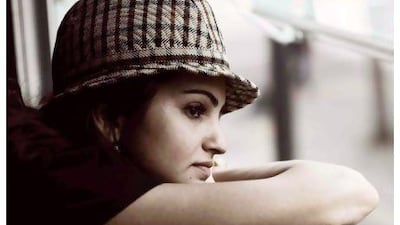The past year has been something of a first for filmmaking in Saudi Arabia, a country still without a cinema to call its own. Much of the attention has been dominated by the GFF opener Wadjda, the first feature to be wholly shot in the kingdom by its first female director, Haifaa Al Mansour. But following closely behind comes the short film Sanctity, which earlier this year became the first Saudi film to appear at the Berlin Film Festival.
“It was in the official competition and was also the first short over 30 minutes long that made it in the history of the festival,” says Ahd, the singular stage name of the rising filmmaker and actress Ahd Kamel.
In Sanctity, Ahd directs herself as Areej, a recently widowed and pregnant woman in Jeddah who makes ends meet by taking in a young drug dealer while fending off the unwanted advances of her brother-in-law. But while the film has been earning her recognition both in front of and behind the camera (she said one of the Berlin screenings was completely packed), it’s the acting side where she’s choosing to focus for the time being.
“I love both; both feed different parts of me,” say Ahd, who studied animation at Parsons in New York before going to film school to study directing and on to an acting conservatory. “But directing is more of a vision and I like to take my time, so as I develop my future, I’d love to be in the front of the camera.” While Sanctity may be restricted to film festivals (it recently screened in London as part of the Birds Eye View Film Festival and is set to appear in the Ismailia Film Festival in June), cinemagoers across Europe are getting to see Ahd in action thanks to the continuing commercial success of Haifaa Al Mansour’s groundbreaking debut feature.
In Wadjda, Ahd plays the strict principal in the title character’s school, a role that involved plenty of stern faces and telling off. “I was initially supposed to play the mother,” she admits. But Al Mansour [who Ahd met at the Torino Film Lab while working on the script for Wadjda] insisted she take the part of the main antagonist. “And I’m happy she did because it was a much different kind of challenge, to be a little bit evil. Usually I’m cast as these very, very oppressed, dismissive women.”
The story of Wadjda – about a young girl brought up near Riyadh in a religious society biased almost entirely towards men – was also something new for Ahd.
“I grew up on the west coast, which is more open. My upbringing was completely different. I went to international schools and it was much more mixed. So to me, it was a completely new world, a new story for me.”
However, Ahd does admit that her family in Jeddah were initially against her decision to pursue filmmaking. “Not because they were against the idea, but because they were afraid. Nobody has done this before, so it was out of fear.”
But with success has come respect for her career choice and now Ahd – along with Al Mansour – are two filmmakers helping push boundaries and break down barriers, while at the same time opening up a new window on life in a country not understood by much of the world.
“We’re always spoken for, nobody ever speaks for themselves. Even when women do speak for themselves, there’s always a shadow that follows them,” Ahd says.
“So I think it’s really a result of all that. It’s fantastic.”
Today's pick
Cotton
Grand Cinemas 8, 11.30am
This short from the Iraqi director Luay Fadhil follows the trials of a young girl and her experiences while sponsoring a sheep. The film, which is getting its world premiere, is actually one of the success stories of GFF, having been selected during the funding cycle last year of the new Enjaaz Short Film fund.
Follow us
Follow us on Facebook for discussions, entertainment, reviews, wellness and news.

